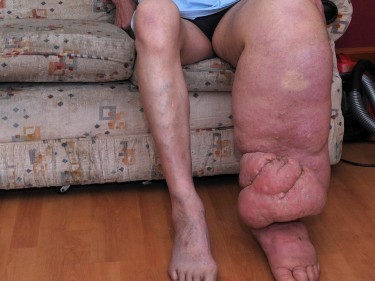A pensioner branded a modern-day Elephant Man has accused the medical profession of turning its back on him.
Michael Cull has endured a 10-year nightmare as he watched his left leg balloon to more than two stone in weight.
The 66-year-old struggles to walk any distance and suffers abuse from strangers when he leaves the house.
But despite repeated visits to doctors and specialists north and south of the border, Mr Cull has been told there is nothing that can be done to treat his condition.
Health bosses refused to discuss his complaints with the Press and Journal, but last night, the retired computer technician from Aberdeenshire said the failure to act had all but wrecked his life.
“It has been an absolute nightmare,” he said.
“Ten years of my life have been virtually destroyed.
“It was like I didn’t exist.”
Mr Cull, who lives in Union Street, Rosehearty, near Fraserburgh, first noticed the symptoms following a car accident while he was living in London.
When swelling appeared around his knee, he visited a hospital and was told it was like a “sports injury” which would calm down eventually. He was later diagnosed as having gross Lymphedema.
After moving to Scotland he began visiting GPs at the Finlayson Street medical practice in Fraserburgh and was referred to Aberdeen Royal Infirmary, where he was given stockings which failed to halt the problem.
The swelling has now spread from his toes up to his hip, leaving his leg lumpy and deformed.
It was only after Mr Cull contacted First Minister Alex Salmond that he was referred to a consultant in Dundee last year – and was given what he hoped was a breakthrough diagnosis.
“He took one look at it and said he had never seen this in the UK before,” he recalled.
“He said it was elephantiasis, and that you only got it in third world countries.”
The specialist also discovered his kidneys were being affected by the disease and large cysts had formed on them.
But when Mr Cull visited the London Hospital of Tropical Diseases earlier this year on the recommendation of a friend, blood tests failed to find any signs of the parasite which is the most common cause of the disease.
He is now waiting to see a vascular surgeon in Aberdeen and has yet to learn if the NHS will foot the bill for any operation.
Mr Cull said he was tired of waiting and “very angry” about the lack of action from the authorities.
“It should never have got to this stage,” he said.
“They should have been monitoring me from the beginning to see how it progressed, but it just seemed like on every level no one was interested.
“I used to blame myself for allowing it to go on for so long or for not being more forceful, but I thought you could trust doctors, they were the professionals.
“I just feel like I’ve been completely let down.”
A spokesman for the Finlayson Street medical practice in Fraserburgh said staff were unable to comment on individual patients due to confidentiality reasons but would be happy to discuss the issues with Mr Cull himself.
A spokeswoman for NHS Grampian also urged Mr Cull to get in touch with his practice to discuss matters.
According to the World Health Organisation, almost 1.4 billion people in 73 countries worldwide are threatened by lymphatic filariasis, a parasitic infection that leads to a disease commonly known as elephantiasis.
Infection occurs when filarial parasites are transmitted to humans through mosquitoes. It is usually acquired in childhood causing hidden damage to the lymphatic system.
The painful and profoundly disfiguring visible manifestations of the disease, lymphoedema, elephantiasis and scrotal swelling occur later in life and lead to permanent disability. These patients are not only physically disabled, but suffer mental, social and financial losses contributing to stigma and poverty.
Approximately 80% of cases are found in the following 10 countries: Bangladesh, Democratic Republic of Congo, Ethiopia, India, Indonesia, Myanmar, Nigeria, Nepal, Philippines and the United Republic of Tanzania.
One of the most famous cases of elephantiasis was Joseph Merrick, who later became known as the Elephant Man. He developed symptoms at an early age and died at the age of 27 in April 1890. It is understood he died from a dislocated neck when he lay down to sleep, due to the huge weight of his head.
Read the full interview in today’s YL magazine.

